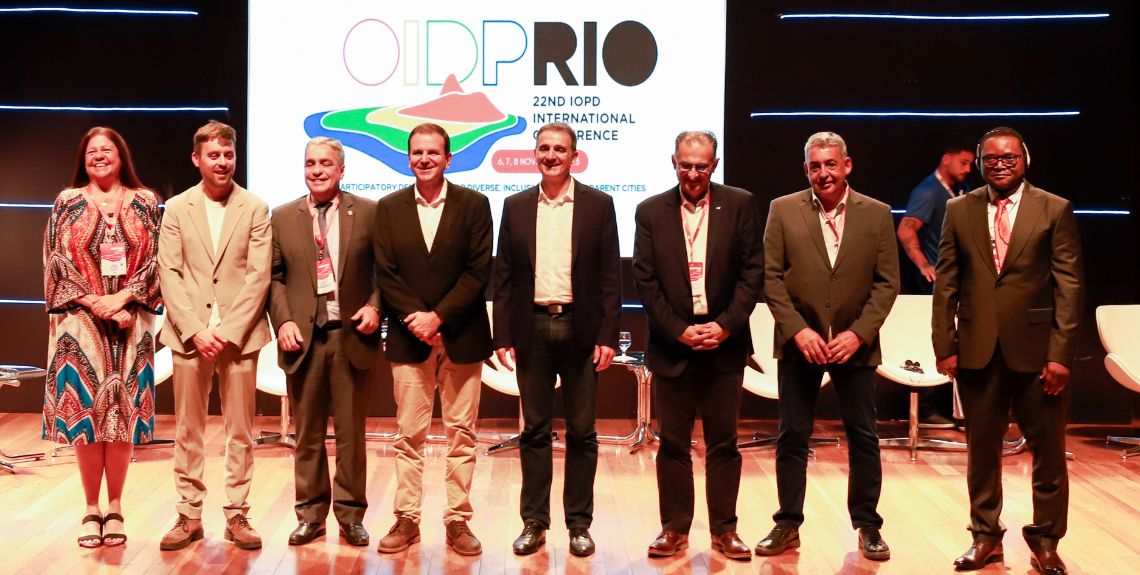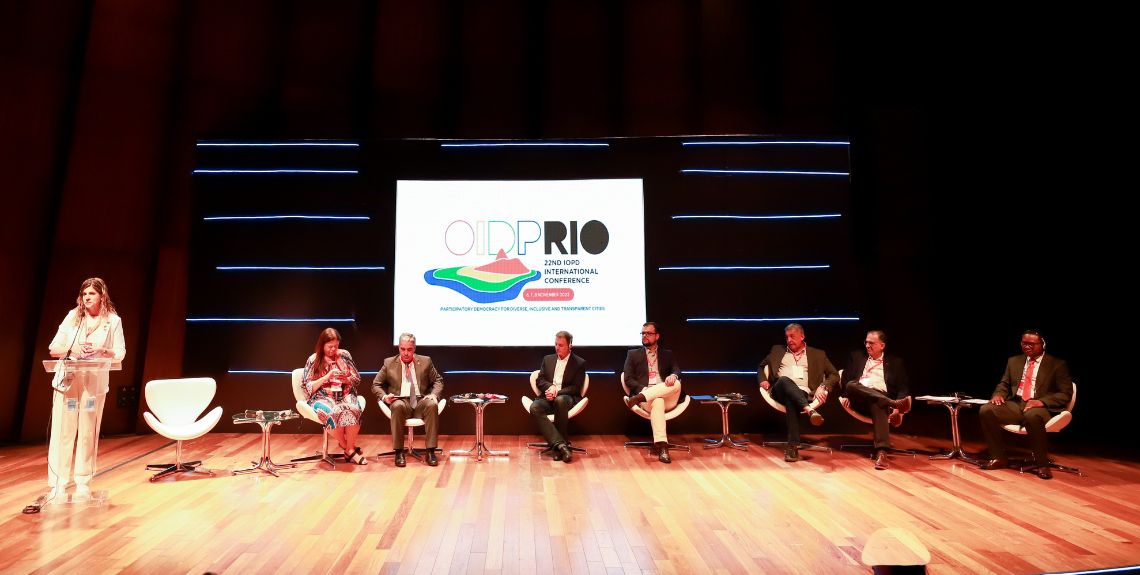From 6 to 8 November 2023, the city of Rio de Janeiro, with the support of the IOPD Secretariat and United Cities and Local Governments (UCLG), organised our 22nd annual major gathering of local leaders to share their experiences on local participatory and deliberative democracy. The event took place at the Cidade das Artes cultural complex in Rio de Janeiro, hosting over 800 participants from more than 46 countries.
The main topic of our 22th conference was "Participatory Democracy for Diverse, Inclusive, and Transparent Cities," focusing on discussing, exchanging experiences, and proposing actions to enhance local democratic institutions, achieving more inclusive cities for all individuals, as well as reflecting on a concept of citizenship linked to democracy. In a context of significant challenges to democratic systems and threats to fundamental rights, local and regional governments, along with the power of civil society, have a duty to drive a renewal and deepening of bottom-up democratic practices.

© Marco Antonio Lima / Prefeitura do Rio
The 22nd IOPD Conference was inaugurated on 6 November with the Opening Ceremony, led by Eduardo Paes, Mayor of Rio de Janeiro and President of IOPD, Éric Piolle, Mayor of Grenoble and Co-President of our network, Marc Serra, representative of the Barcelona Provincial Council and the OIPD General Secretariat.
This was followed by the Political Debate with Local Leaders among Éric Piolle, Mayor of Grenoble; André Ceciliano, Special Secretary of Federative Affairs of Brazil; Jairo Jorge, Mayor of Canoas; Omer Maurille, Head of the third district of Cotonou; Sebastião Melo, Mayor of Porto Alegre; Laura Carneiro, Federal Deputy of Brazil; and Lucas Padilha, Coordinator of International Relations and Cooperation of Rio de Janeiro. It was moderated by Fabiana Goyeneche, representative of UCLG and Coordinator of International Relations of Montevideo. The local leaders agreed that a more transparent democracy that is closer to citizens is necessary to regain trust, in the midst of a context of extremism, hate speeches and socio-ecological crises.
"We decided to be here at the #OIDPRio2023 Conference to build a horizon of alternatives," said Lucas Padilha.

© Marco Antonio Lima / Prefeitura do Rio
On 7 November, the Plenary Session "Inclusion and Diversity" took place, where seven local leaders shared their municipalist experiences in achieving the inclusion of diversity in democratic mechanisms, such as participatory budgets, citizens' assemblies, and participatory planning. Alexandre Almeida, Mayor of Paredes, Luis Newton, Mayor of Estrela, Nelly Patricia Ouassenan, Deputy Mayor of Cocody, Flavie Boukhenoufa, Deputy Mayor of Rennes, Esmênia Miranda, Deputy Mayor of San Luis, Katia Lima, General Coordinator of Planning and Participatory Budget of the Federal Government of Brazil. It was moderated by Tainá de Paula, Municipal Secretary of Environment and Climate of Rio de Janeiro. This was followed by another panel organised by the Rio Women's Secretariat on political violence against women and reforms, with speakers including Veronica Martinez, Advisor to the Federal Congress of Mexico, Beatriz Bogossian, Councillor of Tres Rios, Esmênia Miranda, Vice-Mayor of São Luanda, and Esmênia Miranda, Vice-Mayor of São Luanda: Beatriz Bogossian, Councillor of Tres Rios, Esmênia Miranda, Vice-Mayor of São Luís.
Throughout the three days of our conference, over 40 sessions, debate panels, and experience exchanges between local and regional governments were held across the four explored axes: Inclusion and Diversity - Gender Equality, Participation and Deliberation, Transparency and Open Government, and Citizenship and Democracy. Specifically, the participants shared their experiences of participatory democracy around feminism, anti-racism, migration, childhood, youth, and participation systems. Furthermore, as a novelty in our Conference this year, Rio de Janeiro introduced the format of the Speaker's Corner, where different organisations and cities that promote inclusive mechanisms of participatory democracy shared their initiatives.
UCLG Highlight Sessions
UCLG, together with the Mayor's Mechanism and the Platform for Young and Migrant Children, facilitated the session: "Harnessing the participation of (young) migrants and refugees to co-design inclusive local policies and reshape public narratives on human mobility." Speakers included Matheus Tavares Ferreira de Andrade, Coordinator of Human Rights at the Special Secretariat for Citizenship of Rio de Janeiro, Lais Loureiro, Project Officer at the Migration Youth and Children Platform, Fátima Fernández, Migration Projects Manager UCLG, and Patrice Allais, Deputy Director General of Solidarity, Citizenship, and Culture. In the session, participants highlighted the fundamental role of UCLG in promoting the active participation of young people in such a crucial issue as human mobility, in order to demand better public reception policies and the guarantee of human rights and basic services for the population in these conditions.
The Commission on Social Inclusion, Participatory Democracy, and Human Rights of UCLG (UCLG-CSIPDHR) led the session "Building the future of human rights: the second wave." This meeting was an opportunity to continue the momentum of the second wave of their Global campaign "10, 100, 1000 Human Rights Cities and Territories by 2030," aiming to mobilize local and regional authorities worldwide to build societies that respect human rights, equality, and dignity for all individuals. Anabelle Breton, Deputy mayor of Grenoble, Yago Feitosa, from the Civil House of Rio de Janeiro, Márcio de Jagun, Coordinator of Religious Diversity of Rio de Janeiro and Fabiana Goyeneche, Coordinator of International Relations of Montevideo, which was the latest city to officially adhere to the global campaign during that session.
The next day, the CSIPDHR along with the Executive Coordination for the Promotion of Racial Equality in Rio de Janeiro organized "What makes a city anti-racist? Proposing an agenda for local action," where Barcelona, Rio de Janeiro and Salvador shared their municipal experiences in promoting anti-racism.Participants included Anabel Rodriguez, Director of Citizenship Rights Services of Barcelona; Oilda Rejane, Municipal Secretary of Racial Reparation of Salvador, and Jackeline Nascimento, advisor from Rio de Janeiro.
Award Ceremony of the 17th IOPD "Best Practice in Citizen Participation."
The ceremony for the 17th IOPD Award "Best Practice in Citizen Participation" took place on Thursday, 7 November. It was chaired by our president Eduardo Paes, Mayor of Rio de Janeiro, and our co-president, Éric Piolle. The city and metropolis of Rennes were awarded for their experience "European Citizen Initiative: 'Ensuring Dignified Reception for Migrants in Europe'." Flavie Boukhenoufa, Deputy Mayor for International Relations, Public Relations, Religious Confessions, and Secularism of Rennes, received the award on behalf of her city.
Special mentions were also awarded to five other highly valued experiences by the jury:
More information about the 17th IOPD Award.
Finally, on 8 November, our General Assembly took place, where our members discussed and adopted the IOPD Work Plan for 2024 and the Final Declaration of Rio de Janeiro. New this year was the creation of a Woman Co-Presidency for an elected local, in charge of championing gender equality in our organisation and local participatory and deliberative democracy. In addition, the baton was passed from Rio de Janeiro to Valongo, the city that will host our conference in 2024.
Thank you for coming to Rio de Janeiro for the annual meeting of participatory democracy! See you in Valongo from October 17th to 19th, 2024!